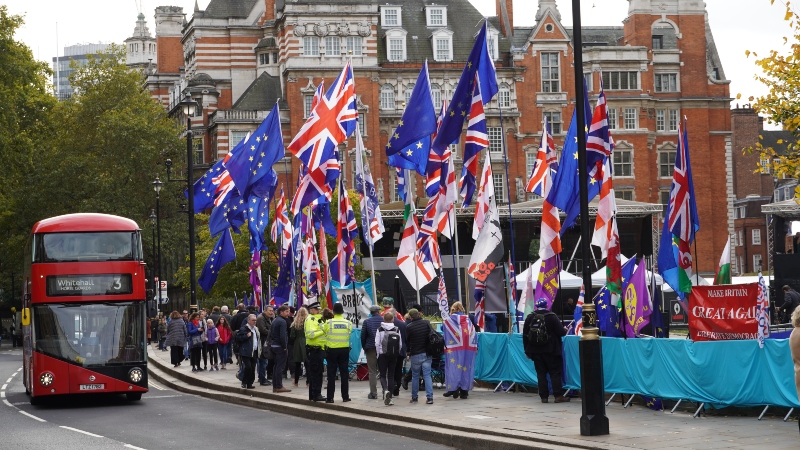Last week Vote Leave laid out its plans for a divorce and a future relationship with the EU. It argued that if voters decided to end UK’s membership of the EU, the UK would negotiate a “friendly deal” with European partners by the next general election in 2020. But this post-referendum roadmap does not hold water, argue Agata Gostyńska-Jakubowska and Adam Lazowski. It would, at best, further antagonise the European partners and, at worst, create economic and legal chaos. Here are four reasons why.
The use of Article 50
Vote Leave argues that article 50 of the Treaty on European Union (TEU), which sets a legal path for EU’s divorce with one of its members, is “not the sole lawful means of leaving the EU”. It claims that an EU-UK treaty could be concluded as an inter-governmental agreement without the involvement of EU institutions. Brexiteers point that the UK could well leave the EU under the Vienna Convention on the Law of Treaties, which codifies rules concerning international agreements. To justify this argument Vote Leave refers, among others, to Greenland, which left the EC in 1985 – long before article 50 was inserted into the EU treaties.
This idea is legally dubious. Article 50 was not employed for a departure of Greenland as it was not yet in the EU law book. But even if it had existed at that time it would not be applicable to Greenland anyway as it was not Denmark leaving the Community, but parts of its territories. Member states introduced article 50 into the EU founding treaties in December 2009 to end all legal disputes about if and how a member state can leave the EU. The same goes for article 49 TEU, which regulates the EU’s accession procedure; it is there to provide a legal framework for EU enlargements. If Brexiteers’ logic were to be applied to that provision, too, then a country could refuse to join the club on the basis of set procedures but invent a tailor-made procedure for itself. This, obviously, would not be possible by any stretch of imagination.
So why do Brexiteers seem to want to ignore article 50, if it provides a path for exit from the EU, which they desire? Most likely, because article 50 puts a departing member state at a disadvantage; it makes clear that the UK will not sit in the European Council and the Council of Ministers to discuss its own case; the EU would prepare its negotiation mandate without the participation of UK diplomats. The UK would be standing alone against the other 27 member states at the same time as they are struggling with a plethora of crises.
Article 50 also sets a two-year deadline to finalise negotiations, which may prove too short to negotiate the terms of divorce. European partners could in theory extend this deadline unilaterally (with the approval of the UK) but they would be reluctant to make things any easier for Britain. European leaders would fear that Brexit could lead in the long run to the EU’s unravelling, and that Eurosceptic forces in other member-states may also want to push for exit if the EU offered the UK generous or special treatment.
Dismissing Article 50
Vote Leave seems to be convinced that Britain could dismiss article 50 or at least postpone triggering it. It has argued that it makes no sense to initiate formal withdrawal talks before post-Brexit government consults stakeholders, including business community and civil society at home and its partners abroad about desired steps forward. Vote Leave claims that it would be able to have a good deal with the EU by 2020 if only post-Brexit government properly prepares for withdrawal talks.
Brexiteers’ idea to consult expert environment is plausible but European partners are unlikely to want to engage in any informal talks before article 50 is triggered. Indeed, article 50 does not provide a timetable for a departing member state to notify its intention to leave, but any attempt to postpone formal withdrawal negotiations would contribute to legal and economic uncertainty which EU leaders would like to avoid.
Vote Leave’s ambitious timeline does not take into account possible obstacles in the withdrawal process, for instance political battles in the European Parliament or potential challenges to legality of this agreement at the Court of Justice. To claim that neither of the two institutions could be involved is close to fallacy. EU rules on conclusion of a withdrawal agreement and, more generally, international treaties are clear (articles 50 TEU and 218 TFEU) and post-Brexit government could not simply disregard them.
Vote Leave’s plan also seems to ignore that the EU would most likely opt for sorting out a divorce first before it negotiates future EU-UK relations. Donald Tusk, the European Council president, recently argued that the EU would keep two processes separate and that “it would take at least five years, and without any guarantee of a success” to agree on the future relationship between the EU and the UK. This is because all member-states (and not a qualified majority as is the case in the withdrawal agreement) would have to adopt the agreement and it would likely have to be ratified by all national parliaments. Some member states may even decide to hold referendums on the agreement. The Netherlands already set the tone when it recently rejected in the plebiscite the association agreement between Ukraine and the EU.
Limiting the jurisdiction of the Court of Justice?
Vote Leave wants to “take control from the EU” even before the UK formally leaves the EU. It argues that the Parliament should amend European Communities Act 1972, which facilitates the supremacy and direct application of EU law in the UK legal order. Vote Leave points that a post-Brexit government should push for domestic laws limiting the jurisdiction of the Court of Justice. Chris Grayling, who is leader of the House of Commons and one of the Leave front men, said that “after Vote to Leave, the public need to see that there is immediate action to take back control from the EU”.
This idea is flawed on many levels. To begin with, the UK would remain a fully-fledged member of the EU until the divorce materialises. Any attempt to limit the Court of Justice’s jurisdiction would be a breach of EU law. Britain would not only expose itself to litigation in the national courts and the Court of Justice but it would also undermine its political credentials. If the UK wanted to strike a good post-divorce deal it should play by the rules with the European Union and its member states. By sending a signal to the entire world that the UK can pull out at ease from its legal obligations, Britain would also undermine its credibility in the eyes of third countries which it would like to trade with.
Taking back the UK’s seat in the WTO
Vote Leave argues that the UK should repatriate the EU’s external commercial policy before it formally leaves the EU. According to Brexiteers this would enable a post-referendum UK to take back its seat in the World Trade Organisation and to start negotiating trade agreements with third countries. This, in theory, is an interesting proposition but it would unlikely to work in practice. Membership of the WTO is not a fait accompli. Roberto Azevêdo, the WTO Director General, warned that post-divorce UK – which is today represented by the EU in trade talks – would have to first conduct negotiations on tariffs with all of its 161 WTO members. The UK would be also bound by all trade agreements concluded by the EU with third countries until the actual divorce from the European Union. Any unilateral decision to the contrary would not change this simple fact.
Vote Leave seems to assume that the entire outside world will just bow to its demands. But the contemporary world of globalised trade works in a different way; it certainly is not Europocentric. Oscar Wilde once said that “wisdom is to have dreams that are big enough not to lose sight when we pursue them”. But Vote Leave seems to be on the path to doing just that. By seeking shortcuts or breaching the law it would unlikely realise its dream of a free-trading Britain outside the EU, but instead it would reduce its bargaining power. Even the world’s fifth largest economy should abide by the rules, be it EU or international law. Otherwise it would not thrive.
____
This post represents was originally posted on LSE BrexitVote.
Agata Gostyńska-Jakubowska is a research fellow at the Centre for European Reform.
Adam Lazowski is Professor of EU Law at the University of Westminster.









I didn’t know they had a plan!
Enough of your condescending comment…WE ARE OUT!!!!
No, we’re not. Stop talking in the present tense about the future.